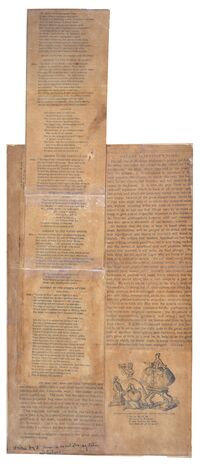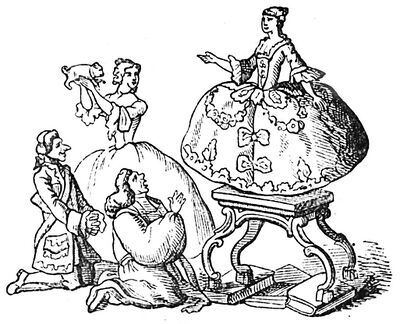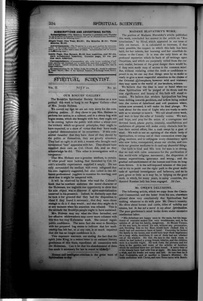The Kobolds are Coming – Oho! Oho!
Mrs. Emma Hardinge Britten, under the heading of " What Spirits are among us ?"–lately discussed in the Banner of Light the above subject. The article, however, was filled mainly with dissertations on the subject of Kobolds, or Earth Spirits, in which miners generally believe, and which, in England, are called by them " Hammerers." She says:
We see no reason to discredit the idea that spirits tenant the interior of the earth as well as the exterior, or to believe that the air, the ether, and the sea are not full of spirit life. All our researches teach us that such is the case. It is well known that the ancient Magi and the Alchemists of the middle ages gave full credit to the existence of such spirits. We have before us a " Tragedy," entitled the " Magian Meroth,"[2] which has been submitted to us for publication, and the advertisement of which appears in another part of this paper ; from it we make an extract which illustrates what we have asserted. It is taken from the first scene in the fourth act, in which the Magian Meroth evokes the Spirit Moloch.

Place–The observatory of Meroth's palace, overlooking the
|
We omit the dialogue which here occurs, which has reference to incidents in the play.
To us a drop of water is a world; and the world does not bear that comparison to infinity which a drop of water does to the ocean. The astronomer tells us that the moon has no atmosphere, but he is not wise who from that assumes that the moon has no inhabitants. The fish might with equal right say to the man, “ You cannot exist where you are; there is no water," as the man assume that existence cannot be maintained in moon, because there is no visibie atmosphere surrounding it. No; it is far wiser to believe, if we cannot prove, that all space is occupied; that the limitless fields of ether are full of inhabitants; that the depths of the sea are tenanted by more numerous indwellers than the land. We only occupy about a third of the house of the world, very probably, the kitchen department; the other two-thirds are not likely to be either vacant or tenanted by less worthy occupants than ourselves. Such being our ideas, we have read with much satisfaction Miss Emma Hardinge Britten's late dissertations, published in the Banner of Light, on materialization, etc. We were particularly struck with admiration of her description of the Kobolds or Gnomes—red, black and copper-colored, who work in the mines. We are glad that she has seen the little devils at their labor, and can verify as to the truth of their existences.
For ourselves, we hail everything of the kind, from the realm of Oberon to the domain of the giant of the Hartz Mountains, as absolute verities, very much more so than the daily commonplaces we meet with in this work-a-day world. We love the dainty Ariel—“ Art,” and have some consideration oven for the deformed Caliban—“ Labor.” True, the latter is an ugly whelp that is apt to bite his best friends, but we love him and would do him good, notwithstanding. When he has had to bring in a little more wood, and his back is a little more galled under his load, he will probably be amenable to reason. We hope so, and shall toil on cheerfully in his cause, trusting that overwork and starvation will assist us to enlighten him in the matter of his rights. But these are speculations. Emma Hardinge Britten's "Kobolds" are facts. She has seen them, and, by-the-bye, very opportunely too, for in the same paper that contains her experience regarding them appears an advertisement of a book concerning them of which she is the sole agent. Singular, in the front page the Kobolds, in the terminating leaf the advertisement of the book. How apropos! Charming! Rejoice, ya Theosophists, the day of your redemption draweth nigh! But we do not admire the terms under which the book is to be issued. Only five hundred copies at $5 each, and then the plates to be remorselessly smashed. As Abraham pleaded for ..dom we feel called upon to ..etrate. O hard-hearted Seeress! peradventure there be six hundred subscribers that desire the book, wilt thou not spare the plates for the sake of the surplus hundred? Peradventure there be fifty—or even ten wilt thou not yield to their importunity? Only fancy, a book containing information on all the spirits that are above the earth, in it and under it—going, going, and the bidders cruelly amited to five hundred. O sapient lady, have mercy! Entreat the Austrian Michael Scott that stands behind thee not to be so hard-hearted. We implore thee by
“ That sacred wine |
by the art of Tubal-Cain; by the holy Kabbala of the Jews; by the Eleusinian mysteries; by the eternal fire of Rosicrucius; by the three sacred hairs in the beard of the prophet Mohammed—reverse thy fearful order, and leave not the millions, outside of the selected five hundred, in the darkness of ignorance forever.
...[3]
..es may say what she likes hereafter, and her effusive whitewashers may cover more columns with this thin but rosy Kalsomine wash. She cannot regain public confidence. The mere fact she went to Brooklyn with her prepared bag seems to indicate that her mediumship has left her, or at any rate, is so much impaired that she has no longer confidence in it.
This exposure warrants our stating the fact that the spirit John King, in a recent letter to an eminent literary gentleman of this State, repudiates all connection with the Holmeses. Can it be that his abandonment of them has made it necessary for her to resort to trickery ?
Honest and intelligent criticism is the great want of Spiritualism to-day.
Madam Blavatsky's Work
The portion of Madame Blavatsky’s article published this week, concluded her answer to the article on “Rea icrucianism,” by Hiraf, which appeared in our issue of July 1st instant. It is calculated to increase, if that were possible, the respect in which this lady has been held, for her talents, her learning and her unselfish devotion to the Cause. It is true she only hints at the profound mysteries which lie back of all writings upon Occultism, and which are purposely veiled from the cursory reader, because of the great danger there would be, if they were made easy of access to the common mind. But, without violating either the truth or confidence reposed in us, we can say that things seen by us make us ready to give a most respectful attention to the claims of the Oriental philosophers, however wild and visionary they may seem to the world of our modern, science.
We believe that the time is near at hand when our sham Spiritualism will be purged of its dross, and the true significance and beauty of this faith will stand revealed. We believe that modern Spiritualism has long been drifting towards perdition, and is now being sucked into the vortex of falsehood and evil passions where, unless now arrested, it will make its final plunge. We look about for the sons of Light who are ready to unite with us to attempt to save it. We call aloud every week, and wait to hear the echo of friendly voices. We wait, and hope, and pray for the union of a courageous and devoted band, whose purity, intensity, unselfishness and usefulness of purpose will make every obstacle bow before their united effort, like a rush swept by a gust of wind. We wait to see an uprising of the whole body of Spiritualists, to sweep out of their connection every juggling, medium, and to subjugate every elementary spirit who now lurks, unsuspected, about our circles, and controls our genuine mediums to do and say shameful things.
Our faith in God and His love for man is so strong, that we wait with calm assurance for the purification of this world-wide religious movement ; the dispersion of human superstitions, ignorance and wrong ; and the gradual enfranchisement of the human soul from its long-worn fetters. It is the self-imposed mission of this journal to try to point out the right path to the great multitude of spiritual investigators and believers, and do its part, great or little as it may be, in helping on the good work in which, for many years, in many countries, this devoted Russian lady has been engaged. Sit Lux.

British Idolatry of the Opera Singer Mingotti.–1756
“Ra, ra, ra, rot ye, |
Editor's notes
- ↑ The Kobolds are Coming – Oho! Oho! by unknown author, Editor's Drawer, p. 234. With a big fragment of tragedy "Magian Meroth" by Robert William Hume.
- ↑ Full text of Magian Meroth by R. W. Hume in PDF is available to download.
- ↑ The following could be the ending of another article.
- ↑ Madam Blavatsky's Work by unknown author (signed as Sit Lux), Spiritual Scientist, v. 2, No. 20, July 22, 1875, p. 234
- ↑ British Idolatry of the Opera Singer Mingotti.–1756 by unknown author
- ↑ Regina Mingotti (1722-1808) was an Italian-Austrian operatic soprano. Notable for being the first woman to manage an opera company in London.
Sources
-
-
Spiritual Scientist, v. 2, No. 20, July 22, 1875, p. 234

